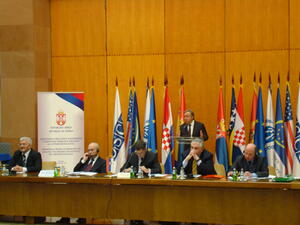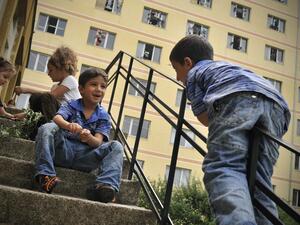UNHCR Note on integration of refugees in the European Union
UNHCR Note on integration of refugees in the European Union
On the occasion of an informal meeting of European Union ministers responsible for integration organized by the German EU Presidency in Potsdam, Germany on 10-11 May, UNHCR has published a Note containing a number of recommendations on how to help integrate refugees in the European Union.
As part of its mandate to assist countries in fulfilling their obligations towards asylum seekers and refugees, UNHCR recently conducted a series of assessments in several EU countries to identify the main obstacles to the integration of refugees and other people in need of international protection.
These obstacles include insufficient knowledge of local languages and differing cultures, lack of understanding within host societies of the specific situation of refugees, and discrimination and unreceptive attitudes towards foreigners, as well as the psychological impact of protracted inactivity during asylum procedures.
Limited access to rights was also identified as an obstacle to the integration of people who have been granted subsidiary protection. UNHCR has consistently advocated for the same rights and integration possibilities to be accorded to these persons as to those who have been recognized as refugees under the 1951 UN Refugee Convention. Their need for international protection is equally compelling and frequently as long in duration as that of refugees.
In the case of asylum seekers, reception policies should be designed to minimize isolation and separation from host communities, as well as to provide for effective language and vocational skills development and assistance to pursue employment.
Such an approach would build on individual skills and resources and empower asylum seekers and refugees to become active members of society, thus increasing their chances of successful integration in the host country or reintegration in their own country upon return. Employment provides the individual not only with an income but also with independence, social status, and recognition.
Accommodation which allows for relations to be built with the host community is also important for future integration. Detention, even if for a short period of time, can have lasting effects on individuals and on their ability to adjust to and integrate in the host society, particularly in the case of children and traumatized persons.
Collective reception centres, while meeting the asylum seekers' immediate housing needs, may have the effect of isolating them from host communities. Frequent changes of place of residence exacerbate instability and hinder active participation of children at school.
Although some of the integration challenges faced by refugees apply also to immigrants, UNHCR encourages EU Member States to develop integration policies which take into account the particular needs of refugees, asylum seekers and beneficiaries of subsidiary protection.





